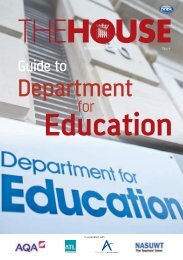Oracy
2fcBkno
2fcBkno
Create successful ePaper yourself
Turn your PDF publications into a flip-book with our unique Google optimized e-Paper software.
Prioritisation<br />
Almost one in five teachers state that the frequency with which they initiate talk-based activities<br />
is sometimes limited by the fact that their school prioritises pupils producing written work.<br />
In England one reason for teachers’ concerns around<br />
prioritisation might be the relative weight given to different<br />
skills by the curriculum and exam specifications. One teacher<br />
describes changes to the primary curriculum as “dramatic” and<br />
believes that some class teachers may have been left with the<br />
impression pupils can only develop academically by writing.<br />
Two secondary English teachers particularly point to revisions<br />
to the GCSE framework, which now includes a spoken<br />
language component that has to be assessed but which does<br />
not count towards pupils’ final grades. They argue that this<br />
can lead teachers to prioritise writing above all else.<br />
Several interviewees in primary<br />
and secondary schools say that<br />
anxiety over what Ofsted wants to<br />
see in lessons might inhibit some<br />
teachers from using talk more often.<br />
Specifically, they feel some teachers<br />
might be concerned if pupils do not<br />
write enough in their books.<br />
This can mean teachers who value<br />
oracy ‘drop it’ in order to prioritise the<br />
development of other skills, or simply to get<br />
through other content.<br />
The perceived need for a tangible ‘output’<br />
from an activity can exacerbate the<br />
prioritisation of writing over oracy.<br />
“I get the impression some teachers are scared<br />
of spending time doing [talk-based tasks], just<br />
having people talking in a class, and they think<br />
that if somebody comes in it looks like nobody’s<br />
doing anything, and they’ve got nothing to show<br />
for it at the end of the lesson”<br />
Mark Crossley, English Teacher & Key Stage 4 Coordinator, King<br />
Edward VI School<br />
Raising the status of GCSE Spoken Language<br />
Mark Crossley is Key Stage 4 Coordinator at King Edward VI<br />
School. He says that teachers and pupils may prioritise other<br />
areas of GCSE English now the spoken language component<br />
does not count towards final grades. Despite his belief in the<br />
importance of spoken language, he says:<br />
“It’s now a box you have to tick,<br />
but it doesn’t actually count<br />
towards anything”<br />
Mark Crossley,<br />
English Teacher & Key Stage 4 Coordinator<br />
To counteract this he says the school is ‘formalising’ the process of assessment so that<br />
it has status. He says the approach will be comparable to what would happen for an oral<br />
assessment in a language exam:<br />
• Pupils will be taken off-timetable to give their<br />
presentations<br />
• They will present to an English teacher in a separate<br />
and quiet space, but not their regular subject teacher<br />
• Pupils will prepare and practise set presentations<br />
throughout the year<br />
• Presentations will be filmed<br />
61




